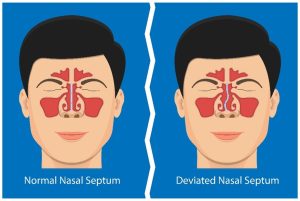Also Serving Nasal Surgery Patients in Everett & Bellingham
Nasal surgery to correct breathing problems can make a big difference in your life. Dr. Jonathan Grant has the experience to address most breathing issues, but the most common problems are:
- A deviated septum – off-center cartilage and bone within the nose that restricts breathing. The procedure that corrects a deviated septum is called septoplasty.
- Nasal valve collapse restricts breathing and sometimes causes snoring. Nasal valve correction surgery can open or expand the nasal valve.
- Turbinate reduction or turbinoplasty reduces the turbinates, which are structures on the inside walls of the nose. They can become swollen, usually due to allergies, and obstruct airflow.
Because no two noses are the same, Dr. Grant understands that each nose surgery needs to be treated differently. He designs a surgical plan to improve your breathing, keeping your safety and comfort in mind. As a thoroughly trained reconstructive facial surgeon, Dr. Grant achieves transformative results for his nasal reconstruction patients.
If you wish to also change the look of your nose, cosmetic rhinoplasty can be done simultaneously with nasal surgery for breathing problems.
Who is a Candidate for Nasal Surgery for Breathing Problems?
Candidates for nasal surgery are those who have consistent breathing problems. Dr. Grant can treat both children and adults. The first step, of course, is to examine the patient and properly diagnose the problem.
Understanding the Nasal Surgery Procedure
 Nasal surgery is performed as an outpatient procedure, meaning you will be able to go home following your surgery. It uses IV anesthetic and sedation, though some patients may require general anesthesia.
Nasal surgery is performed as an outpatient procedure, meaning you will be able to go home following your surgery. It uses IV anesthetic and sedation, though some patients may require general anesthesia.
In the case of septoplasty, the septum must be reshaped so that it no longer restricts breathing.
Turbinate reduction involves removing a portion of the turbinates to make them smaller so that they no longer obstruct breathing when swollen.
Nasal valve correction usually involves removing cartilage from one portion of the nose and using it to rebuild or expand the structure of the collapsed nasal valve.
The incisions are generally placed on the underside of the nose across the columella, the skin that separates the nostrils. The scar is not very noticeable, and it fades and flattens over time.
Recovering From Nasal Surgery
You will probably need to take one or two weeks off from work after nose surgery. A small splint is usually taped on the outside of your nose as it heals. In most cases, the nostrils do not have to be packed, although it is necessary for some patients. To protect your nose, please avoid exercise (including sports where facial injuries are possible) for four to six weeks.
You can expect some discomfort, swelling and mild bruising following your nasal surgery. Additionally, your nose might feel stuffy for a few days, and there could be some bleeding from the nostrils.
Dr. Grant will provide instructions for taking care of your nose. Take pain medication as necessary to relieve discomfort. It is important to avoid blowing your nose, and you will need to sleep on your back for a period of time. If you sleep upright with your head elevated, this should help to minimize the swelling you experience.
Note that swelling is the last symptom to resolve. Be patient as you will notice the improvement in your breathing after the initial healing period.
Nasal Reconstruction FAQs
What causes a deviated septum?
Many people are born with nasal defects that lead to breathing problems. Other people develop them because of an injury from events like a physical fight or car accident. Patients who have previously had a nose surgery are at a heightened risk for developing an obstructed airway. Nasal reconstruction can fix either a congenital deviated septum or one that has become defective later in life.
Can Dr. Grant reshape my nose while clearing up obstructions in my air passageways?
Patients often decide to improve the appearance of their nose with rhinoplasty if the nose is being operated on anyway. If you would like to make modest or significant aesthetic improvements to your nose during nasal reconstruction, please discuss this during a consultation with Dr. Grant so he can devise a surgical plan that improves both the look and functionality of your nose.
What is the difference between “open” and “closed” reconstruction?
Dr. Grant customizes nasal reconstruction surgery to the needs of each patient. Each procedure can fall into one of two categories: “open” or “closed.” Open nasal reconstruction involves making an incision along the strip of skin between the nostrils. Closed surgery places the incisions inside the nostrils. The approach Dr. Grant employs may depend on the extent of reconstruction necessary.
What are the consequences of not fixing a deviated septum?
 An obstructed airway does not clear up on its own, so you will have to deal with the side effects of this condition indefinitely. You may start to experience frequent sinus infections and could be at risk for developing obstructive sleep apnea (which can cause a host of other life-threatening conditions). During a consultation, Dr. Grant can assess your nose and determine whether it is necessary.
An obstructed airway does not clear up on its own, so you will have to deal with the side effects of this condition indefinitely. You may start to experience frequent sinus infections and could be at risk for developing obstructive sleep apnea (which can cause a host of other life-threatening conditions). During a consultation, Dr. Grant can assess your nose and determine whether it is necessary.
Is septoplasty covered by insurance?
If your airway is significantly obstructed, posing problems to your breathing and overall health, then it is likely that your health insurance will cover the procedure. Dr. Grant recommends documenting breathing issues as part of your medical record to increase the chances it is covered. Patients who primarily want rhinoplasty for cosmetic reasons are not likely to have their surgery covered by insurance, and certainly not in full.
Why should I choose Dr. Grant for nasal reconstruction?
Dr. Grant is a double board-certified plastic surgeon who has received accolades and prestigious fellowships. Because he is an expert in both reconstructive and cosmetic procedures, Dr. Grant can ensure that your nose not only functions well, but also looks better than it started by the time it has healed.
Learn More
If you are interested in nasal surgery for breathing problems in the Western Washington area, contact us to find out if you’re a good candidate for the procedure.
Contact Us Today!






